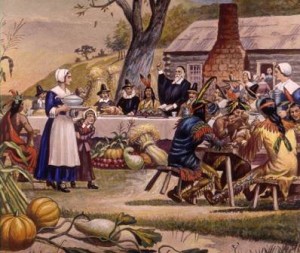Giving Thanks at Thanksgiving … But Not to God
In 1789, America’s first president proclaimed a “day of public thanksgiving and prayer.” George Washington implored the heavens to “pardon our national and other transgressions” and urged the citizenry to practice “true religion and virtue.”
In 1863, Abraham Lincoln urged his countrymen to set aside the last Thursday of November “as a day of Thanksgiving and Praise to our beneficent Father who dwelleth in the Heavens.”
Subsequent presidents continued this civic-religious tradition. “More than three centuries ago, the Pilgrims, after a year of hardship and peril, humbly and reverently set aside a special day upon which to give thanks to God,” said John F. Kennedy in his first Thanksgiving proclamation. “They paused in their labors to give thanks for the blessings that had been bestowed upon them by Divine Providence.” Quoting the Bible, President Kennedy affirmed: “It is a good thing to give thanks unto the Lord.”
That, ladies and gentlemen, was the old America.
In the New America, we apparently know better. Our culture transformers are eagerly remaking Thanksgiving in their own image. This is especially true on the education front.
I was recently alerted to a Thanksgiving Day lesson at the website education.com, a go-to source for teachers. On the main page is a 60-minute lesson plan titled, “Giving Thanks for Thanksgiving.” “Thanksgiving offers an opportunity to teach young students about early days in the original colonies,” the plan informs us. “Students will discover the purpose and people involved in the first Thanksgiving.” The “learning objectives” are succinct: “At the end of this lesson, students will be able to identify the purpose of the first Thanksgiving as well as several people involved in celebrating it.”
The introduction instructs the teacher: “Call students together. Ask students to think about some of their favorite holidays and what they like to do on these holidays. Tell students that Thanksgiving is coming up. Ask students what some of their favorite Thanksgiving traditions are. Read Thanksgiving Day.”
“Thanksgiving Day” is one of three books recommended in the lesson: “Thanksgiving Day” by Anne Rockwell, “Thanksgiving Is …” by Gail Gibbons, and “The Very First Thanksgiving Day” by Rhonda Greene.
I do not own these books. I went to their Amazon.com pages to read the descriptions. There is no mention of God, though there are bountiful references to Native Americans, various tribes, corn, stuffing, and turkeys. The Creator even gets trumped by cranberry sauce.
The review for one of the recommended books, “The Very First Thanksgiving,” states: “This is a beautifully illustrated picture book for young children about the original Thanksgiving feast.” But there is a “caveat,” says the otherwise sympathetic reviewer: “this book nowhere mentions God, who is after all the reason for this holiday.”
The reviewer underscores the “significant historical fact” that the Pilgrims had fled religious persecution, that their Thanksgiving feast was about giving thanks to God, and that Lincoln enacted Thanksgiving Day for just that reason. Thus, writes the reviewer, “the author’s careful avoidance of this fact is a disappointment. But if you are more on the politically correct side, you will find this book to be a perfect introduction to Thanksgiving for your children.”
Indeed, if you’re on the “politically correct side” of the New America, this is perfect—a book that comprehensively airbrushes God from the historical picture.
The “review and closing” portion of the “Thanksgiving” lesson at education.com concludes with these guidelines for the teacher: “Have students line up to present their Thanksgiving fact and what they are thankful for. Congratulate the students on their hard work. Encourage everyone to dig into the yummy food and enjoy having a Thanksgiving feast together!”
Dig in, kids, without a thought of thanking the Almighty.
I ask my secular-liberal friends: Is it any wonder why so many people are homeschooling their kids? Think about it. You can dislike religion, if you prefer. You can even despise it. But a truly “inclusive” education cannot exclude such essential historical facts. This is historical fraud, forgery, perjury.
I’m reminded of a conversation I recently had with a friend who works in the children’s section at Barnes & Noble. She regularly briefs me on the latest political correctness and rank secularism pervading today’s books offered by “educators.” She was cataloguing the stock of Thanksgiving books.
“How are they?” I asked.
“You don’t want to know,” she groaned.
She found only one book in which thanks was given to God.
“Well, then,” I asked her, “what are they giving thanks to?”
“They’re just thankful,” she said vaguely. “They’re simply thankful.”
“’Thankful’ for what?” I replied.
She again emphasized: “They’re just thankful.”
Well, that isn’t Thanksgiving. It never was. Welcome, pilgrim, to the new world.


